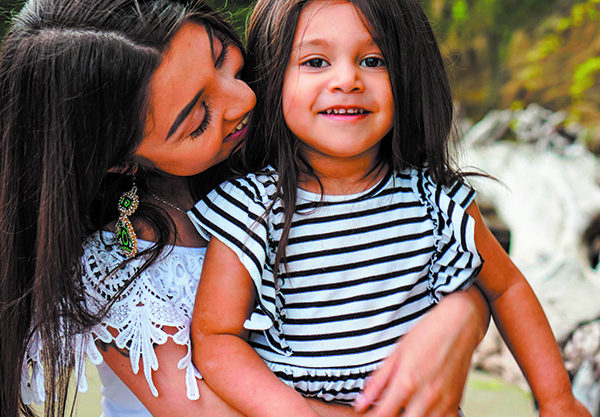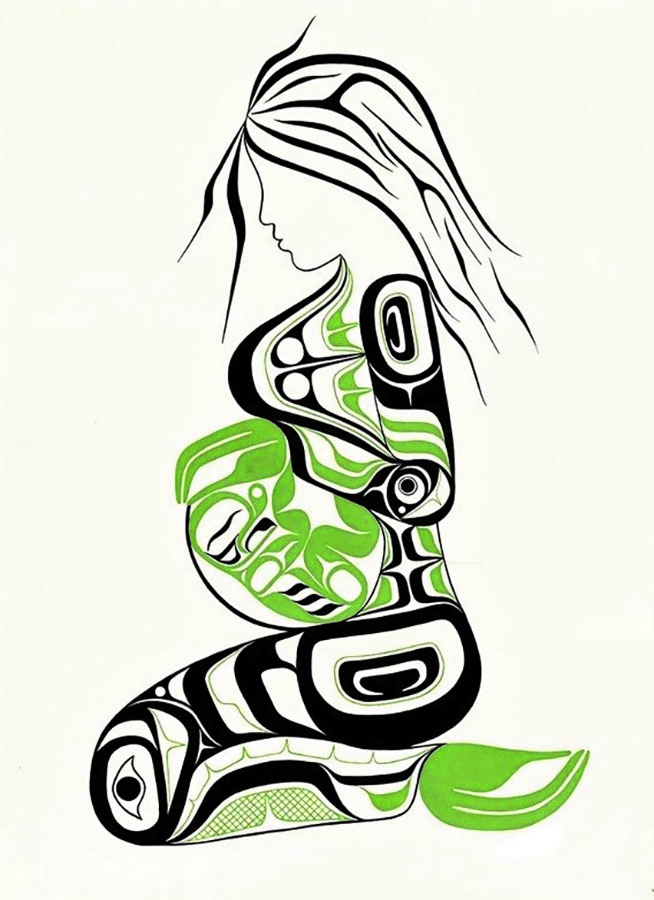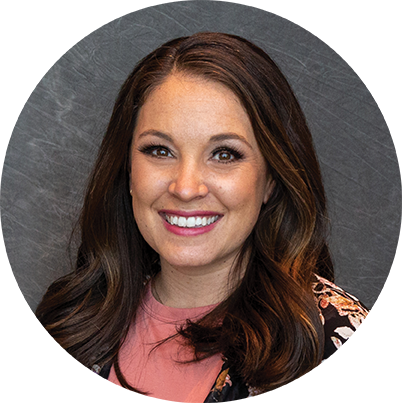
By Micheal Rios, Tulalip News
It takes a village to raise a child is a powerful proverb that means an entire community of people must provide for and interact positively with a child so that it may grow in a safe, healthy, and culturally vibrant environment. On paper it sounds perfect, right? But among the concrete jungles and techno-filled landscapes of modern America, its increasingly difficult to find examples of this proverb being fulfilled.
For expectant mothers and those with babies, not having a village or support system of encouraging individuals around during such a vulnerable time can be devastating. On the Tulalip Reservation, there’s a new program striving to provide that critical support for our life givers. The Maternal Infant Health Program (MIHP) seeks to improve birth outcomes within the Tulalip Tribal community. The program’s vision is to provide education and support resources that create an environment of empowered, educated and supported mothers and children.
To better explain the program’s purpose and services, it’s coordinator, Community Health nurse Morgan Peterson, sat down with Tulalip News for a thorough overview. A Rosebud Sioux tribal member, she’s lived locally to Tulalip most of her life. After receiving her nursing degree and working in OB-GYN offices throughout the area, Morgan has spent the last twelve years dedicated to prenatal health in Tulalip.
What is the purpose of the Maternal Infant Health Program?
“The ultimate goal is for our families to feel empowered and to ensure they are having a birth experience that is positive. For young, first time moms this may mean education and providing a safe space to ask questions or seek guidance. For a mom adding to her family, this may mean improving birth outcomes and healing from past traumas so that mom and baby are treated with the best care available.
A major part of MIHP includes building resiliency. We want our life givers to be confident in all aspects of motherhood. I’m passionate about meeting my clients wherever they are in life, and walking beside them on their journey to self-determination.”
Does this include coordination of home births?
“Yes, it does. More and more moms are choosing to give birth in the comfort of their own home or a setting of their choosing outside of a hospital. We’ll help our life givers achieve their birthing goals, whether it’s by coordinating a hospital birth or navigating the home birth process. There’s different options available to our families, such as birthing centers, too, which we can tour together if they’re interested.”
Are MIHP services for individual mothers only, or can family units be included?
“Having a child in a warm, nurturing environment may mean having your family or even grandparents involved. We understand a lot of Native homes are multi-generational. We are more than willing to work with our Native family units, however they may look, to assist mothers be in the best position possible. If you’re living with your parents, grandparents, or other relations we want to make sure your immediate support system is educated to yours and baby’s needs.”
Breaking cycles of abuse and healing from generational traumas are common concepts to Native parents. Are these processes you help with?
“Our history with boarding schools and the foster care system has resulted in whole generations of traumatized families. If not addressed and healed, then that trauma gets passed on from one generation to the next, which we often see. I understand the intricacies of this process because my grandma was in a boarding school. She was forcibly taken from her family in Pine Ridge and never mothered. She grew up with the nuns, was beaten and stripped of her language. My grandma was never taught to be motherly or maternal, so when she raised her kids, she provided for them, but was never motherly. That’s to say she wasn’t loving. That led to my mom wanting to be better, and to do so she had to learn to be loving because she wasn’t taught that by my grandma.
We understand everyone is trying to be better than the generation before, but it’s often difficult to admit these traumas that need to be healed so we don’t pass them on to our kids. That’s where we can help by offering services to learn how to change parenting styles in order for our children to be nurtured and feel loved.”

The concept of ‘birth outcome’ is new. You mentioned your goal to improve them, but what does a negative birth outcome mean?
“A common negative outcome is described by those who have experienced racism and traumas by medical providers or the medical community at large. Those who have felt judged or were treated as addicts, and those who experienced a general lack of cultural competency by their providers, all lead to negative birth outcomes.
Another common one is unnecessary CPS reports or accusations of bad parenting that lead new parents or parents with multiple kids to avoid routine doctor visits and check-ups. Teen moms can feel shunned and stereotyped in ways that deter them from receiving the critical information and services they need.
We seek to improve birth outcomes by providing education and support resources that create a positive environment where mothers and their children feel supported. This includes recommending medical providers who are familiar with Native American culture and are sensitive to the unique aspects and issues of Tulalip families.”
Can you share one of your favorite improved birth outcome experiences?
“Sure. One of my favorites is about a mom who found out she was pregnant while in jail. She contacted me after she was got out and was living in a halfway house while going to treatment…all while having a new born baby. I was familiar with their family and knew where the traumas come from. Their parents had massive addiction. Assisting this mom build the resiliency to stay strong, find the right support system for her, and maintain a journey of sobriety was life changing for her and her children. That was a couple years ago when she called me, and she’s still sober to this day. Her journey and love for her children inspired one of her parents to get clean as well. This is an inspirational story for some and motivational for others. It lets them know what’s possible.”
For an expectant mother or mom with a new born, what does the MIHP startup process look like?
“It starts with either a simple phone call or in-person visit, whichever they prefer. We would discuss their pregnancy, how they are doing, and what services they need. Each mom is unique as is what she may need help with. Our help ranges from maternal and infant health assessments; pregnancy and parenting support; infant health and development education; breastfeeding and nutrition support; and referrals/registration to community resources based on their needs. Just to name a few. We have so many possible services and ways of helping our new moms.”
The Maternal Infant Health Program is an evidence-based, culturally-tailored home visiting partnership designed to assist, support, and empower expectant moms (those currently pregnant) and moms with children under 3-years-old. If you or a loved one meets these criteria and could benefit from hearing all of the amazing details this program can offer, please contact Morgan directly via email mpeterson@tulaliptribes-nsn.gov or call/text 360-926-5978.
